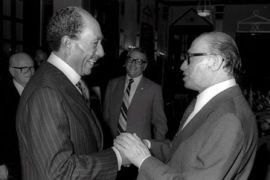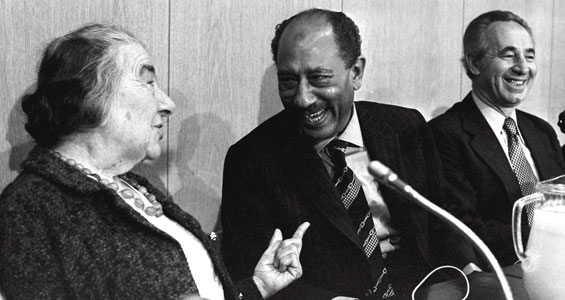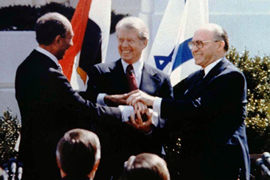Interview: Sadat’s peace gambit
Former US negotiator says Egypt’s treaty with Israel weakened Arab unity.

 |
| Golda Meir, left, and Anwar Sadat, centre, discussed peace prospects in Jerusalem in 1979 [EPA] |
On March 26, 1979, Egypt and Israel signed a peace treaty which effectively ended a state of war and attrition that had lasted more than 30 years.
William Quandt, a professor of political science at the University of Virginia, was actively involved in the negotiations that led to the Camp David Accords of September 1978 and the Egyptian-Israeli Peace Treaty of March 1979.
He believes that by signing the peace treaty with Israel, Anwar Sadat, the then-Egyptian president, correctly read the geopolitical patterns that were emerging in the region.
| IN DEPTH | |||||||||||
|
Iran had deposed the Shah and the Shia clergy had seized the government, the former Soviet Union was preparing to invade Afghanistan, and inter-Arab disputes were rife.
Quandt said the treaty was a blow to pan-Arabism, but was certainly not as fatal as the Arab defeat during the 1967 war.
Quandt has authored several books on the Arab-Israeli conflict, including Peace Process: American Diplomacy and the Arab-Israeli Conflict Since 1967; Camp David: Peacemaking and Politics; and Decade of Decisions: American Foreign Policy Toward the Arab-Israeli Conflict, 1967-1976.
Al Jazeera: Do you think that the 1973 war paved the way for the Camp David peace accords and eventually the March 1979 peace treaty?
Quandt: Yes, Sadat seems to have felt that he needed to prove himself on the battlefield before engaging in negotiations for a final agreement.
The war also seems to have convinced him that he could not afford to subordinate Egyptian interests to a broader notion of pan-Arabism, nor could he count on the Soviets.
Other Arab countries together with the Palestinians felt betrayed by Egypt’s move. Did Sadat intend to make a separate peace with Israel? Or did he truly envision a comprehensive settlement of the Arab-Israeli conflict as he announced?
I cannot say what was going on in Sadat’s head, but his initial commitment to a comprehensive agreement, or at least to general principles for peace that would be applied to each front, seemed genuine to me.
But, as time went on and he became more aware of how adamantly other Arab countries opposed peace with Israel, he seems to have become more of an ‘Egypt-firster’.
He also resented the fact that other Arab leaders were criticising him for not being a good Arab, and he responded by treating them with contempt.
How did the 1979 peace treaty affect inter-Arab relations?
Pretty clearly Egypt was largely isolated; the Arab League was moved to Tunis; and Saddam Hussein, the then-president of Iraq, tried to fill the vacuum by pretending to be the new [Gamal Abdel] Nasser, former president of Egypt.
If Sadat had not signed the peace treaty, do you think that Arabs would have had a unified Arab position in any future negotiations with the Israelis?
No, the Arab stance was fragile at best, and since the 1967 war there was little left of the big Arab unity project.
Maybe even after the breakup of the United Arab Republic (a union between Egypt and Syria), it was clear that integral Arab unity was not on the cards.
Do you think that the peace treaty was a blow to Arab nationalism?
Yes, but not the first, and not the most fatal blow – the breakup of the United Arab Republic and the 1967 Arab defeat in the Six Day War were more significant.
Osama bin Laden, the al-Qaeda leader, and others have accused Arab states, such as Egypt, of colluding with Israel in the recent war on Gaza. Thirty years on, does Cairo’s peace with Tel Aviv harm its stature in the Arab world?
It’s a mixed result. Hamas deals with Egypt because Egypt has ties with Israel. But there are also Arab parties who still resent that Egypt put its own interests first when it sued for peace.
 |
| Egyptian, US and Israeli leaders shake hands to seal the 1979 peace treaty [GALLO/GETTY] |
Less than 30 years after signing the 1979 peace treaty, almost all Arab countries have some sort of diplomatic ties with Israel. Do you think that Sadat was a visionary?
I would not use the word “visionary”, but I think he correctly read the trends in the region – the decline of Soviet power vis-a-vis the United States; Israel as a fact of life; no real prospects for Arab unity; huge costs to Egypt of staying on a confrontational course.
He was at least as much a realist as a visionary.
How does the Saudi-sponsored Arab Peace Initiative stand up to the Egypt-Israel Peace Treaty?
The Arab Peace Initiative is realistic in the same way that Sadat was realistic – Israel is a fact of life. But the Saudi-sponsored initiative differs in that it calls for a comprehensive settlement.
Sadat would have also preferred that but he was ready to settle for a bilateral agreement when it became clear that was the only choice.
In your opinion, who benefited the most from the peace treaty? Egypt – by ending the cycle of war with Israel; or Israel – by neutralising a major Arab country?
They both benefited, but probably Israel benefited more.
Both countries maintain diplomatic relations but little to no social, cultural, or economic ties. Why have both countries been unable to build their relations?
It has been good for those who crafted it – Israel, Egypt and the United States.
Without it, there would have been more costly wars. But, no doubt, others in the region felt let down; the myth that Egypt would somehow lead the Arab world to the liberation of Palestine and the achievement of unity had always been mostly myth.
Some people find it hard to give up the dream, but that does not mean that clinging to the dream would necessarily make them happy.
The peace might have been a bit warmer if the Israeli-Palestinian and/or Israeli-Syrian conflicts had been resolved. Without that there is still too much conflict between Israel and its other neighbours.
Egyptians are aware of this and they don’t like it.
Egypt and Israel are two very different countries and it would take time even in the best of circumstances for a warm peace to evolve.
Is a two-state solution for the Israeli-Palestinian conflict still feasible?
We won’t know for sure unless a serious effort is made and there has been no such effort since the 1990s.
But the odds are not good. The difficulty is that there is no other model that holds out more promise in the short-term for a resolution to this conflict.
